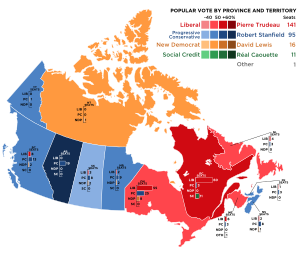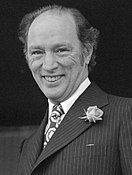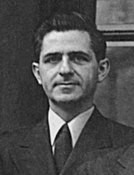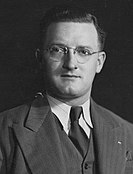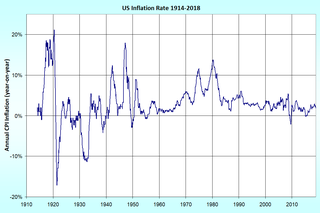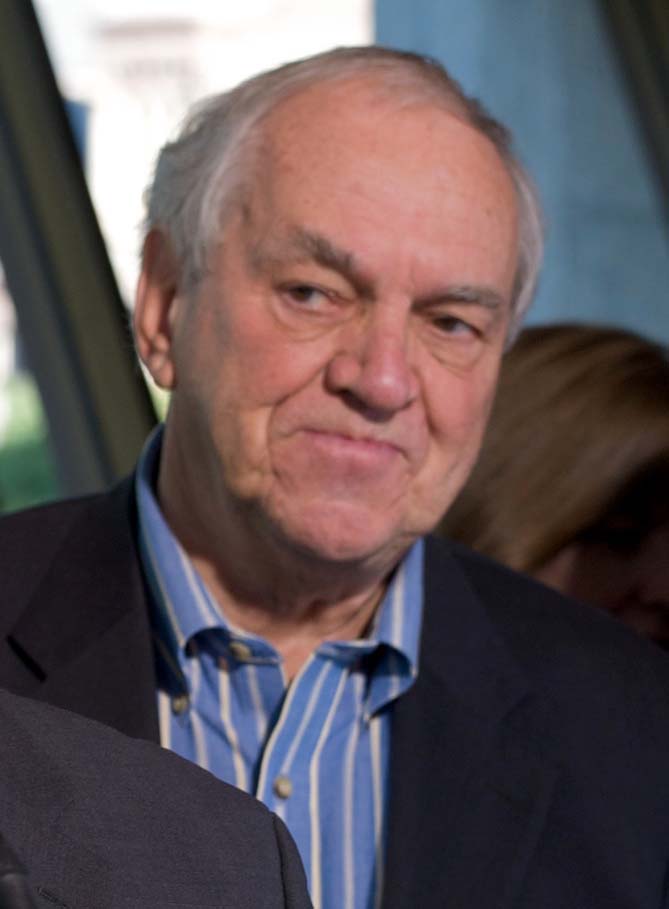
Ernest Charles Manning,, a Canadian politician, was the eighth premier of Alberta between 1943 and 1968 for the Social Credit Party of Alberta. He served longer than any other premier in the province's history and was the second longest serving provincial premier in Canadian history. He was also the only member of the Social Credit Party of Canada to sit in the Senate and, with the party shut out of the House of Commons in 1980, was its very last representative in Parliament.

The Canadian federal election of 1993 was held on October 25 of that year to elect members to the House of Commons of Canada of the 35th Parliament of Canada. Fourteen parties competed for the 295 seats in the House at that time. It was one of the most eventful elections in Canada's history, with more than half of the electorate switching parties from the 1988 election. The Liberals, led by Jean Chrétien, won a strong majority in the House and formed the next government of Canada.
The Canadian social credit movement is a Canadian political movement originally based on the Social Credit theory of Major C. H. Douglas. Its supporters were colloquially known as Socreds in English and créditistes in French. It gained popularity and its own political party in the 1930s, as a result of the Great Depression.

The Ontario New Democratic Party is a social-democratic political party in Ontario, Canada. The Ontario NDP, led by Andrea Horwath since March 2009, currently forms the Official Opposition in Ontario following the 2018 general election. It is a provincial section of the federal New Democratic Party. It was formed in October 1961 from the Co-operative Commonwealth Federation and the Ontario Federation of Labour (OFL).

The Canadian federal election of 1972 was held on October 30, 1972, to elect members of the House of Commons of Canada of the 29th Parliament of Canada. It resulted in a slim victory for the governing Liberal Party, which won 109 seats, compared to 107 seats for the opposition Progressive Conservatives. A further 48 seats were won by other parties and independents. On election night, the results appeared to give 109 seats to the Tories, but once the counting had finished the next day, the final results gave the Liberals a minority government and left the New Democratic Party led by David Lewis holding the balance of power. See 29th Canadian parliament for a full list of MPs elected.

Robert Lorne Stanfield, was the 17th Premier of Nova Scotia and leader of the federal Progressive Conservative Party of Canada. He was born into an affluent Nova Scotia clothing manufacturing and political family in 1914. He graduated from Dalhousie University and Harvard Law School in the 1930s. Stanfield became the leader of the Nova Scotia Progressive Conservative Party in 1948, and after a rebuilding period, led the party to government in 1956. As premier, he won three straight elections. His government was credited with modernizing the way the province delivered education and medical services. In 1967, he resigned as premier and became the leader of the federal Progressive Conservative Party. He was the leader of the Her Majesty's Loyal Opposition and fought three general elections, losing each time to the Liberals under Pierre Trudeau. He resigned as leader in 1976 and from public office in 1979. In retirement, he lived mostly in Ottawa, and died there in 2003 from complications due to pneumonia. He is sometimes referred to as "the best prime minister Canada never had". As one of Canada's most distinguished and respected statesmen, he was one of several people granted the style "The Right Honourable" who were not so entitled by virtue of an office held.

The Canadian federal election of 1984 was held on September 4 of that year to elect members of the House of Commons of Canada of the 33rd Parliament of Canada. The Progressive Conservative Party, led by Brian Mulroney, won the largest landslide majority government in Canadian history, while the Liberals suffered what at that time was the worst defeat for a governing party at the federal level. Only the Progressive Conservatives faced a larger defeat, when cut to two seats in 1993.

The Canadian federal election of 1968 was held on June 25, 1968, to elect members of the House of Commons of Canada of the 28th Parliament of Canada. The Liberal Party won a majority government under its new leader, Prime Minister Pierre Trudeau.

The Canadian federal election of 1980 was held on February 18, 1980, to elect members of the House of Commons of Canada of the 32nd Parliament of Canada. It was called when the minority Progressive Conservative government led by Prime Minister Joe Clark was defeated in the Commons.
Robert Norman Thompson was a Canadian politician, chiropractor, and educator. He was born in Duluth, Minnesota, to Canadian parents and moved to Canada in 1918 with his family. Raised in Alberta, he graduated from the Palmer School of Chiropractic in 1939 and worked as a chiropractor and then as a teacher before serving in the Royal Canadian Air Force during World War II.

The Canadian federal election of 1979 was held on May 22, 1979, to elect members of the House of Commons of Canada of the 31st Parliament of Canada. It resulted in the defeat of the Liberal Party of Canada after 11 years in power under Prime Minister Pierre Trudeau. Joe Clark led the Progressive Conservative Party to power, but with only a minority of seats in the House of Commons. The Liberals, however, did beat the Progressive Conservatives in the overall popular vote by more than 400,000 votes.

The Canadian federal election of 1962 was held on June 18, 1962 to elect members of the House of Commons of Canada of the 25th Parliament of Canada. When the election was called, Progressive Conservative (PC) Prime Minister John Diefenbaker had governed for four years with the then-largest majority in the House of Commons in Canadian history.

The Canadian federal election of 1963 was held on April 8 to elect members of the House of Commons of Canada of the 26th Parliament of Canada. It resulted in the defeat of the minority Progressive Conservative (Tory) government of Prime Minister John Diefenbaker. For Social Credit, despite getting their highest ever share of the vote, the party lost 6 seats compared to its high-water mark in 1962.

The Alberta general election of 1971 was the seventeenth general election in the Province of Alberta, Canada. It was held on August 30, 1971, to elect members of the Legislative Assembly of Alberta.
The Alberta general election of 1982 was the twentieth general election for the Province of Alberta, Canada. It was held on November 2, 1982, to elect members of the Legislative Assembly of Alberta.
In 1963, the Quebec wing of the Social Credit Party of Canada split off from the national party as the Ralliement des créditistes. The split had its roots in a long-standing dispute between the de facto leader of the Ralliement, Réal Caouette, and the party’s national leader, Robert N. Thompson. At the party’s 1960 leadership convention, held two years after the party lost all of its seats in the House of Commons of Canada, Thompson defeated Caouette for the leadership. The party returned to Parliament in the 1962 federal election, but all but four of its 29 MPs came from Quebec. Under the circumstances, Thompson was all but forced to name Caouette as deputy leader of the party. The relationship was strained, however, and the strain was exacerbated when the party failed to make any gains in its old heartland of the Prairies in the 1963 federal election. Only Thompson and three others were elected outside of Quebec, while 20 Socreds were elected in Quebec. The two factions of the party were not re-united until October 1971.
This article covers the history of the New Democratic Party of Canada.
